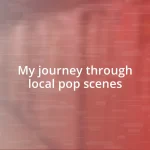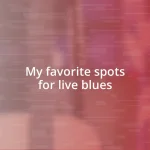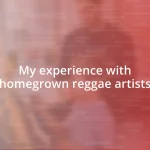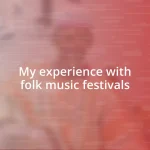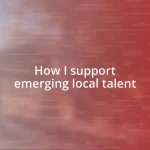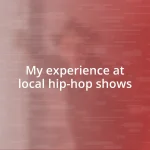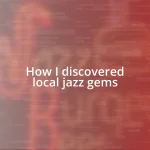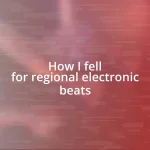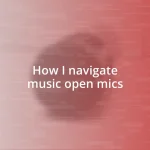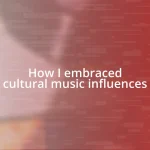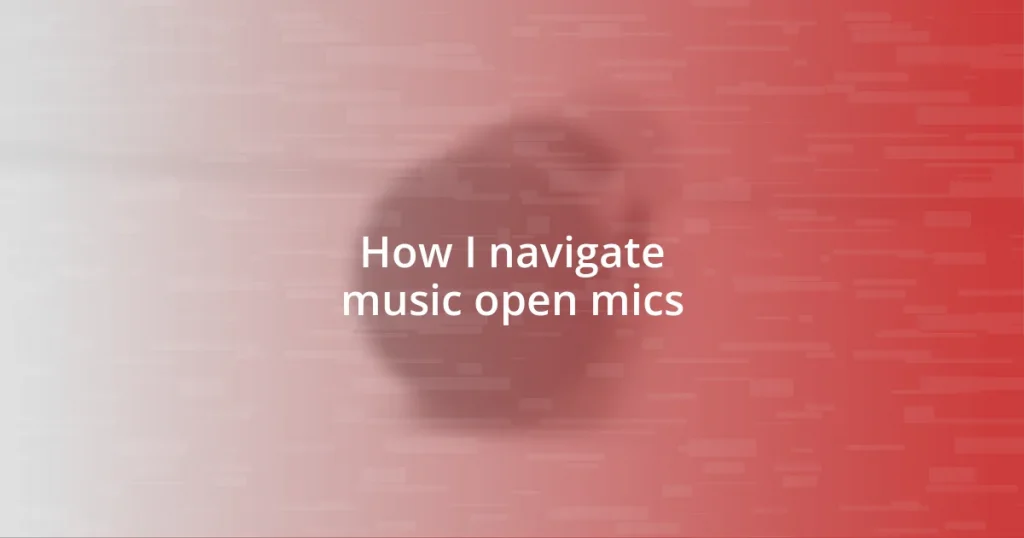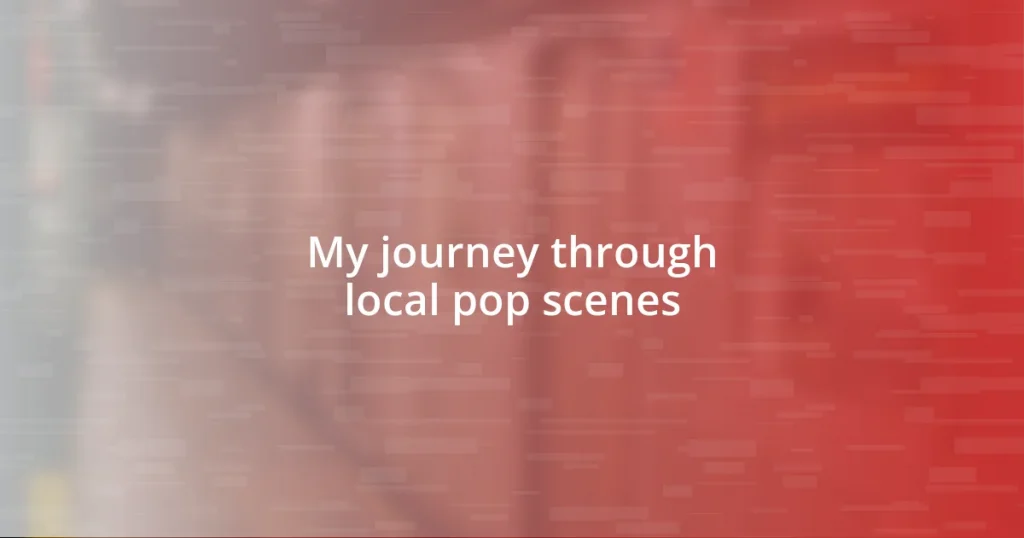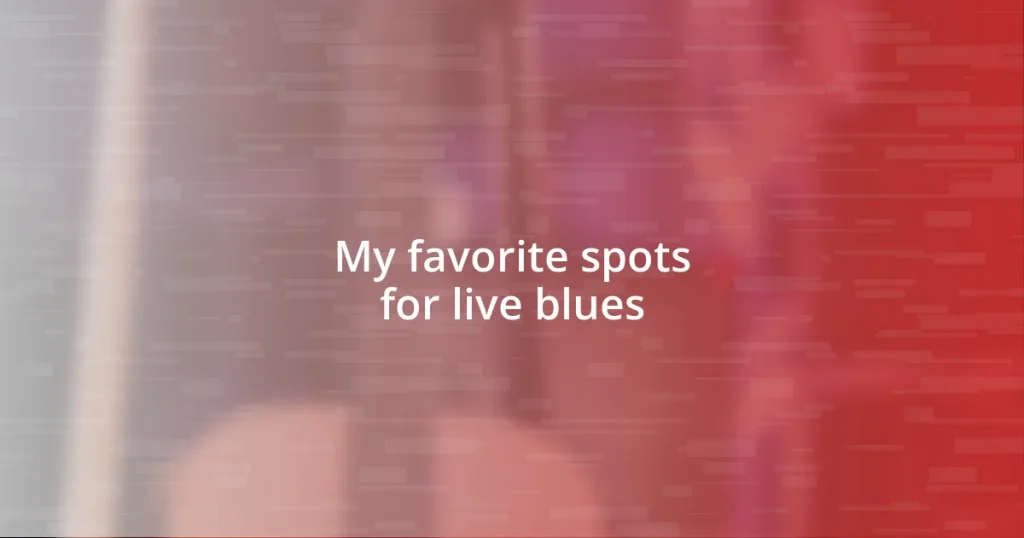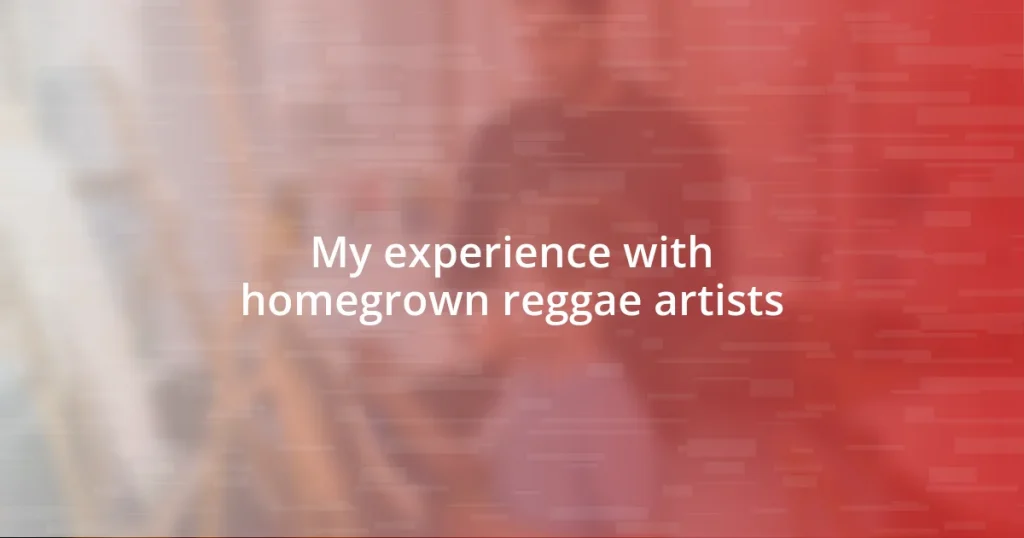Key takeaways:
- Open mics offer a supportive environment for musicians to showcase their talents, test new material, and foster creativity through diverse musical styles.
- Success at open mics hinges on preparation, audience engagement, and authenticity, which strengthen the performer-audience connection.
- Networking with fellow musicians and gathering feedback after performances are crucial for personal growth and can lead to collaboration opportunities.
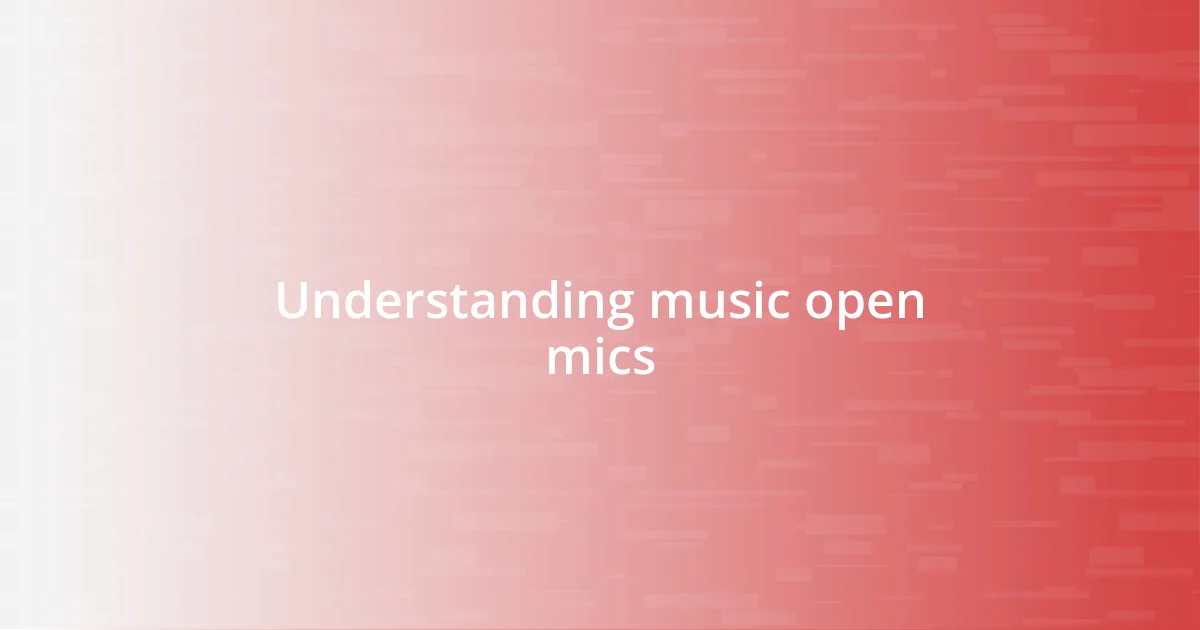
Understanding music open mics
Music open mics are vibrant spaces where aspiring musicians can showcase their talents, often providing a supportive community for artists of all levels. I still remember my first time stepping onto an open mic stage. My hands were clammy, stomach fluttering with nerves. Why do we put ourselves in these situations? It’s about the thrill of connection—sharing your voice and your story with people who genuinely appreciate music.
These events serve as a unique platform for testing new material and receiving feedback, both from listeners and fellow musicians. I’ve found that even when I botched a chord or two, the applause at the end made the experience feel rewarding. It’s crucial not just to perform but to embrace the learning process that comes with it. After all, how else can we grow as artists?
Open mics bring together a rich tapestry of musical styles, from folk to hip-hop, creating an eclectic atmosphere that inspires creativity. I often leave these nights buzzing with ideas, thinking about how a late-night jam session can ignite collaborations that transcend genres. Each performance is a reminder that music is a universal language, uniting us in ways that words alone often cannot.
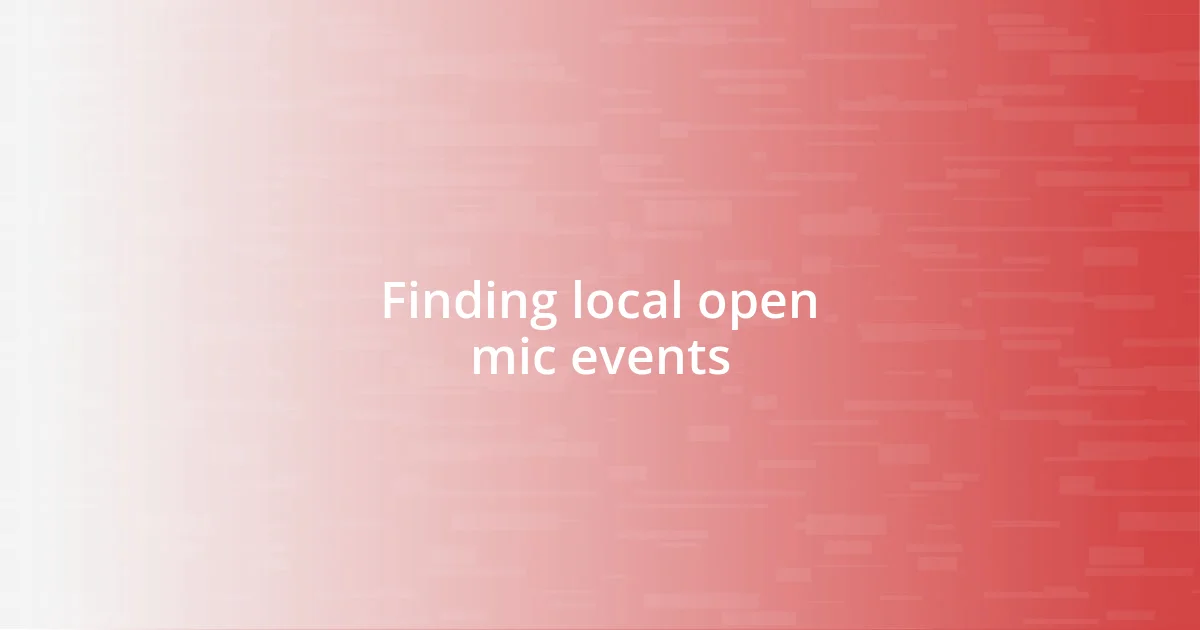
Finding local open mic events
Finding local open mic events can sometimes feel like searching for hidden treasures in your community. I often turn to social media, where local musicians and venues frequently post updates. Facebook groups dedicated to local music scenes can be gold mines for discovering upcoming gigs. Each time I stumble upon a new event, it’s like igniting that familiar spark of excitement.
Here are some useful places to look for local open mic events:
- Social Media: Check platforms like Facebook, Instagram, or Twitter for event announcements.
- Local Music Venues: Visit or call nearby cafés, bars, or theaters that regularly host performances.
- Community Boards: Look for bulletin boards in coffee shops and community centers.
- Music Forums: Join online communities like Reddit or specialized forums where artists share local gig opportunities.
- Word of Mouth: Never underestimate the music scene’s grapevine; talking to fellow musicians can reveal hidden gems.
I’ve even met incredible artists just by asking around — the connections made off-stage can sometimes be as rewarding as the performances themselves. Each event not only hones my skills but also helps me expand my network and deepen my love for music.
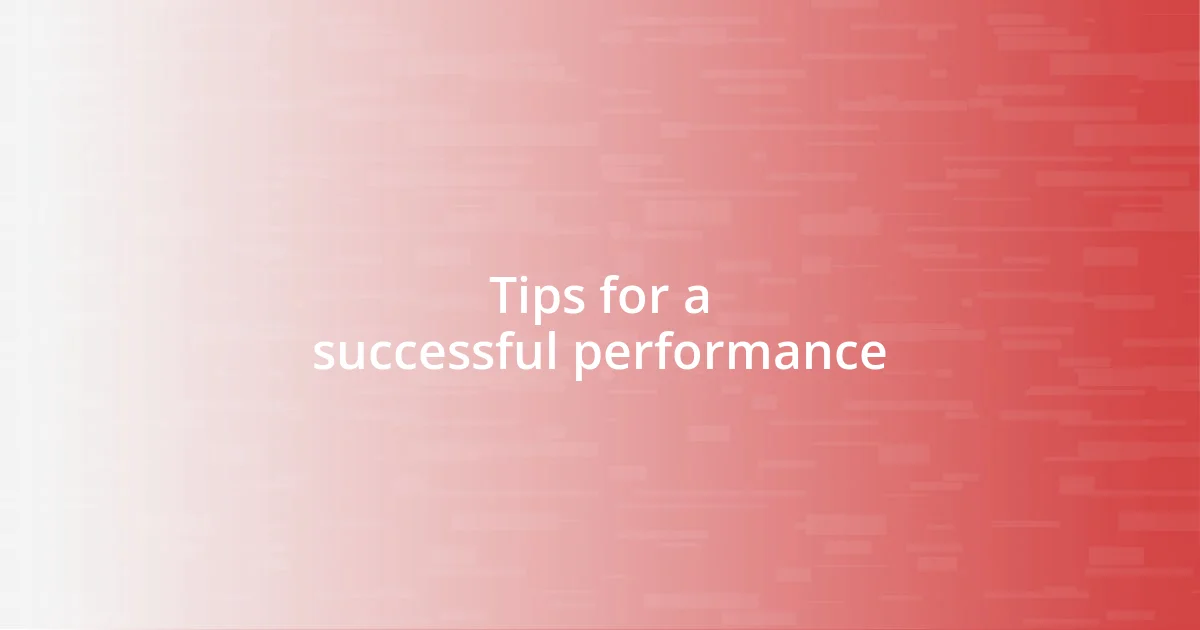
Tips for a successful performance
When it comes to a successful performance at an open mic, preparation is key. I always make it a point to rehearse my set multiple times before stepping onto that stage. The energy in the room can be overwhelming, so knowing your material inside and out allows you to focus more on connecting with the audience and less on worrying about forgetting lyrics or chords.
Another crucial tip is to engage with the audience right from the start. I’ve learned that a simple smile or a genuine hello can break the ice and turn an intimidating crowd into a supportive one. When I recall moments when I interacted with listeners, the vibe instantly shifted, making the performance not just a showcase but a shared experience.
Lastly, don’t underestimate the power of authenticity. I remember performing a particularly vulnerable song about heartbreak, and sharing that piece of myself made my connection with the audience deeper. Those raw moments often resonate the most, creating lasting memories for both the performer and the crowd.
| Preparation Tips | Engagement Techniques |
|---|---|
| Practice your set multiple times | Make eye contact with the audience |
| Familiarize yourself with the venue | Interact with the crowd before, during, and after your performance |
| Choose the right songs that suit your style | Share stories or inspirations behind your songs |
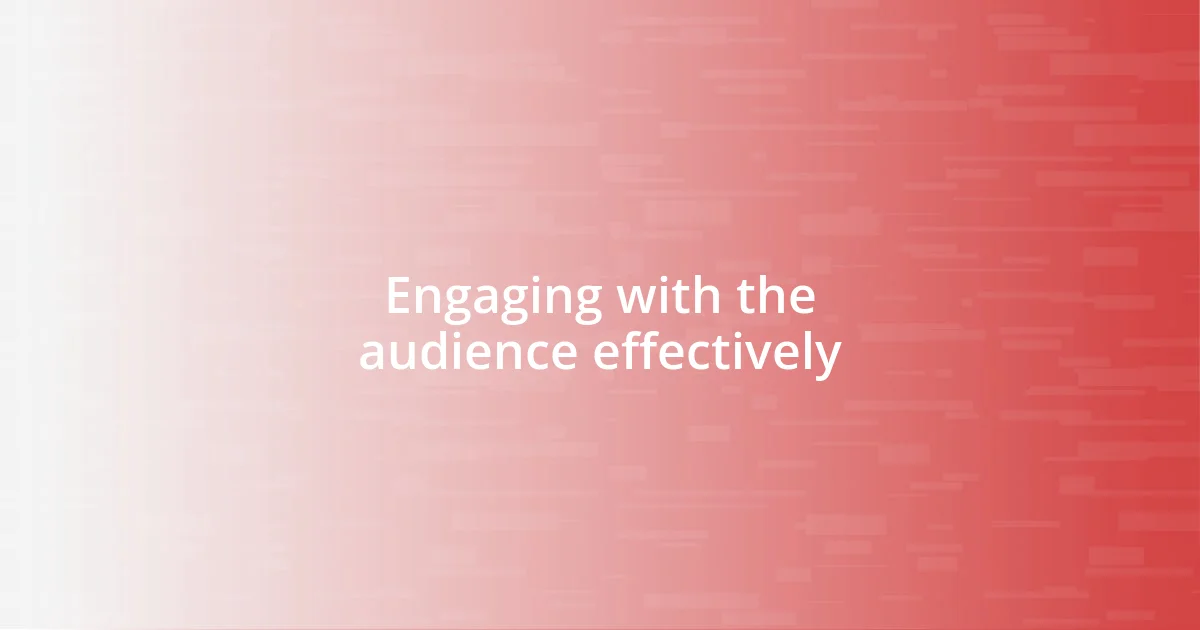
Engaging with the audience effectively
Engaging with the audience effectively is really about creating a genuine connection. I remember one night, I spotted a couple smiling and swaying to my music. That little moment motivated me to step closer and sing just for them. It’s amazing how simple gestures can transform a distant crowd into an intimate gathering. Have you ever felt that shift when someone locks eyes with you during a performance?
Making an authentic connection goes beyond just your voice; it’s about sharing your journey too. When I shared the story behind one of my songs—a tale of overcoming adversity—I noticed nods and smiles of understanding throughout the room. The audience doesn’t just want to hear a melody; they want to feel it. I firmly believe that sharing those snippets of personal experiences fosters empathy and resonates on a deeper level.
Lastly, don’t underestimate the power of spontaneity during your set. One evening, a song I had planned to perform just didn’t feel right, so I switched it up and invited the audience to suggest something instead. The energy skyrocketed as they cheered for their favorite tracks. It was electrifying! How often do we allow ourselves to adapt and thrive in the moment? I think it’s these experiences that make every open mic unique and unforgettable.
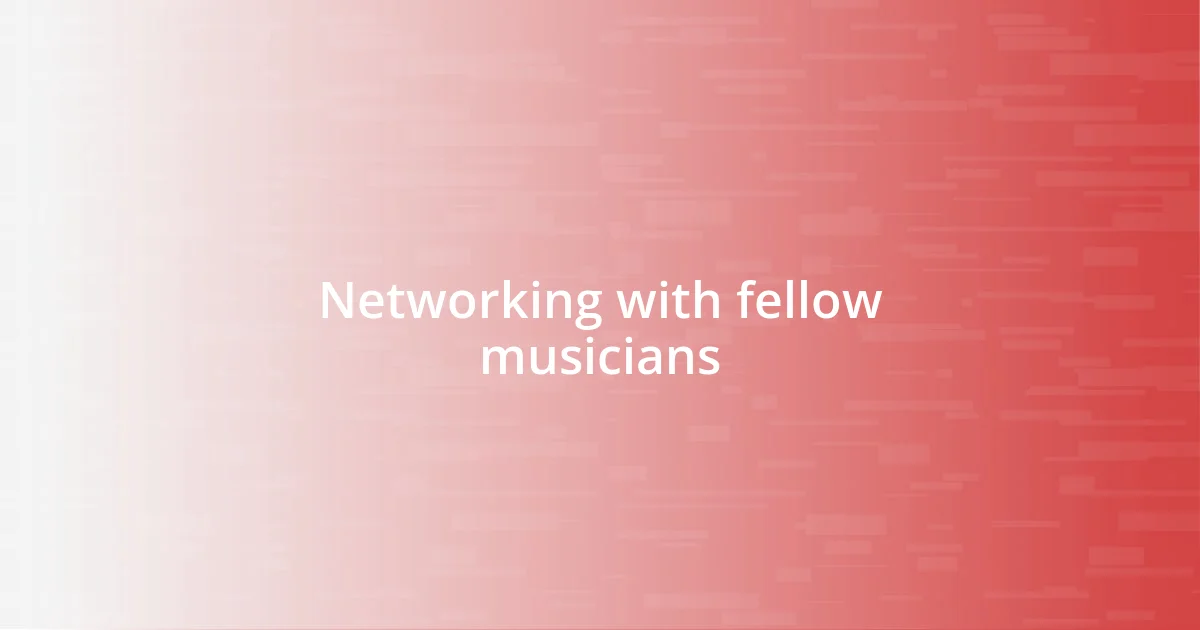
Networking with fellow musicians
Networking with fellow musicians is one of the hidden gems of open mics. I remember the first time I struck up a conversation with another performer after our sets. We talked about our influences, and I felt an immediate sense of camaraderie, realizing that we were all on this journey together. Have you ever found inspiration in someone else’s story? Those connections can spark collaborations or simply offer fresh perspectives on music.
Making an effort to connect with fellow artists backstage or during breaks can be rewarding. I’ve had countless moments where I’ve exchanged social media handles or even shared a stage later on with someone I met at an open mic. It’s those initial conversations that often lead to gig opportunities or shared songwriting sessions. How often do we overlook the potential friendships waiting just beyond a simple “hello”?
What truly stands out for me is how sharing our challenges and triumphs can create a supportive community. I once met a guitarist who opened up about his struggles with performance anxiety. Hearing his story made me reflect on my own challenges, and we ended up brainstorming ways to support each other on our musical paths. Isn’t it remarkable how vulnerability can forge deeper bonds? Without a doubt, networking at open mics enriches not just our careers, but our personal growth as artists.
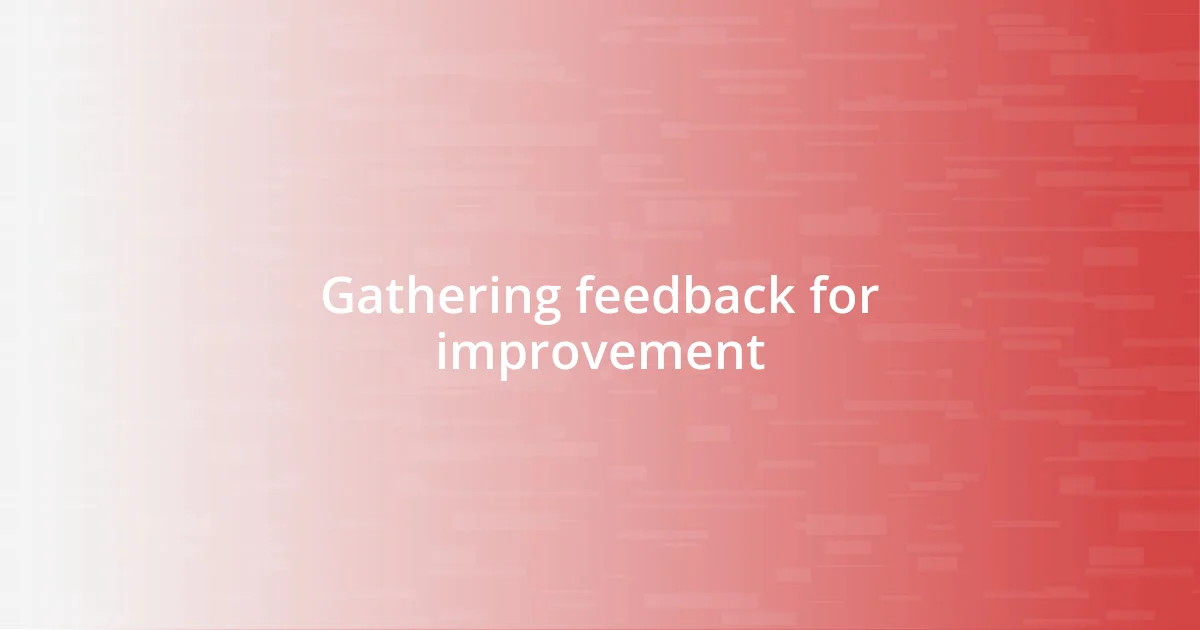
Gathering feedback for improvement
Gathering feedback after performing is essential for personal growth as an artist. I vividly remember one night when I finished a set, and a regular at the open mic approached me, keen to share his thoughts. He noted how my stage presence felt a bit stiff and suggested I try to be more relaxed between songs. That genuine feedback changed how I approached future performances. Have you ever received advice that shifted your perspective?
The easiest way to collect feedback is to create an open line of communication with your audience. I’ve started incorporating a simple practice: after my set, I invite listeners to chat with me and share their thoughts. Sometimes, it’s the smallest comments—a nod about a catchy lyric or a remark on my guitar playing—that spark significant changes in my songwriting and delivery. I always ask, “What did you feel during that song?” This simple question often leads to insightful discussions.
I also find value in recording my performances. When I watch them back, I can see the moments where I connect with my audience—or miss the mark. Last month, during one of my sets, I noticed I was looking down too much instead of engaging with the crowd. Seeing that on video was eye-opening. How often do we forget to really look at our audience? Capturing those moments helps me refine my craft and makes each performance a bit stronger than the last.
